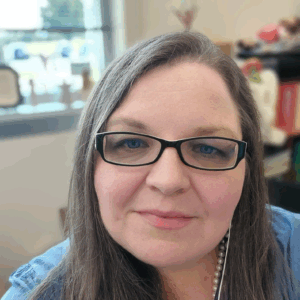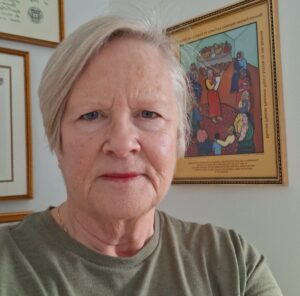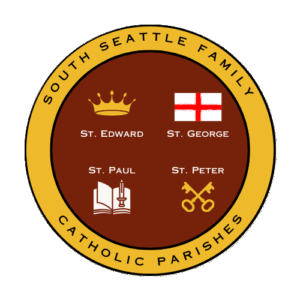“Sometimes I’m tired, but I go because I need to be there for the people.”

An interview with Rosella Kinoshameg
Rosella Kinoshameg is from the Odawa/Ojibway people and lives in the Wiikwemkoong Unceded Reserve in Manitoulin Island, Ontario, Canada. She’s a mother, grandmother, and great grandmother – and a retired registered nurse who worked for more than 50 years with First Nation communities as a Community Health Nurse. In 2000 she was commissioned by her bishop as a member of the Diocesan Order of Service, known as DOS. She has ecclesial recognition as a leader in her Indigenous Catholic community, presiding over communion services, leading prayers at funerals and wakes, and ministering to the sick and dying.
As a girl, Rosella attended Catholic residential school, and now as an elder, she chairs the board of the Indigenous Reconciliation Fund. The fund – which is the Canadian Catholic Commitment to the Healing and Reconciliation of Indigenous Peoples – has raised more than $14 million dollars approving 163 projects to date to address the historical trauma of indigenous people and to better enculturate indigenous traditions. Rosella shared her testimony at our synodal listening session Discerning Diakonia.
Talk about a time when you experienced the call to serve in ministry.
I have always liked going to church, and I liked religious classes. My father taught me how to play the organ at age 12 at our parish Our Lady of Grace, one of four churches under Holy Cross Mission, and later the elders asked me to chair the parish council. I had to learn everything, and that’s how it started.
Tell a story about a ministry you are engaged in today and why it is important to you.
As Odawa/Ojibway people, we experience the Catholic faith best through our culture. In 2000, I was mandated as Diocesan Order of Service, known as DOS, and the formation is like that of the deacon. I serve the people of God in the Native Sector, Diocese of Sault Ste. Marie, Ontario by carrying out the ministries of acolyte and lector and assisting in other ministries necessary to the life of the church community. This goes back to the 1975 vision of Bishop Alexander Carter when Anishinabe Spiritual Centre and the native ministries program was established, “to encourage the native people to rediscover their roots and to value their own culture and the beauties of some of their ceremonies and early traditions.” Through the Centre, Jesuits and Indigenous partners work to enculturate the faith and repair relationships.
When our diocese received the new bishop, Bishop Thomas Dowd, he phoned me to express interest in learning about our indigenous culture, language, rituals, beliefs, and traditions. At the Chrism Mass, I prayed a prayer of the faithful in Ojibway and led the smudging/purification ceremony. The Mass included Drumming and two Ojibway hymns.
What do you want people to know about or understand about your ministry?
As a DOS, I think about liturgy, service and the work of healing and justice. I have led workshops to train Eucharistic Ministers to take Communion to the sick at home and in the hospital. I work with the dying on their journey to return to the Creator. I preside over Communion Services and wakes, and when I prepare reflections, I always think of the people, their way of life, and the problems they may be encountering so we can take our prayers up to the Creator.
Having been raised with traditional teachings and having worked as a Community Health Nurse, I recognize and understand the intergenerational trauma in my family and Indigenous communities that has been caused by residential schools. I agreed to be on the board of the Indigenous Reconciliation Fund because I want to be part of the healing that is so greatly needed.
How do you work in a co-responsible way with the priests and lay people?
At our Wiikwemikoong Unceded Reserve of more than 4,000 people on reserve, we have about 100 funerals a year, sometimes three in a week. There is a severe drug epidemic that is severely harming our people and our precious children. If I had a magic wand, it would be to eliminate the drug dealers from coming in. As a community we are trying to work on this drug problem, and it takes a long time to address it. At the Anishinabe Spiritual Center, the Jesuits are open to preparing women to help in the parishes. At my parish I help the priest with the wakes, assist with the funerals, and go to the cemetery. Sometimes I’m tired, but I go because I need to be there for the people.
What is a favorite scripture passage that gives you strength and resilience for these times?
“I chose you” (from John 15:16). We were studying that Scripture at a retreat. God chooses you for a certain type of work. It’s a precious statement to be told by God that he chose you to do his work.
What difference does it make for your community for you to serve in ministry?
The people know me as a DOS, and they recognize me as having a stable vocation. They see me on Sunday helping Fr. Paul, giving out Communion, accepting the gifts, setting the table if the deacon is not there, and now occasionally smudging at the beginning of Mass. It is mostly women who deliver Communion to the sick and who go out to the hospital. At the wakes, we welcome the body into the community, lead the rosary and the closing prayers before the casket is closed. It’s not just me, there are other women who assist in doing the work.
What is the anniversary date of your baptism?
February 18


